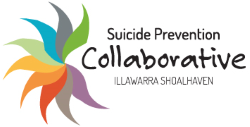Hope lost her father and brother to suicide - this is why she wants people to talk about it.
Story by Natalie Croxon, Photo by Robert Peet, Illawarra Mercury.
After Hope Carberry's beloved father Frank took his life in November 2014, she didn't think she would have to face the torment of losing someone to suicide again.
But in 2021 her younger brother Andrew - a "bit of a ratbag" who was "the epitome of a country guy" - also died by suicide, at the age of 38.
"I had no idea, because my sister [Tara] and I are incredibly close and we were both of the frame of mind that we were safe and protected from further suicide because we knew how awful it was to go through this," Ms Carberry said.
Ms Carberry, who now works for StandBy Support After Suicide and the Illawarra Shoalhaven Suicide Prevention Collaborative, said suicide was a complex issue but people bereaved by suicide were eight to nine times more likely to take their own lives.
But her family received no support after Frank's death.
While she "would do anything not to die by suicide" knowing how terrible the aftermath was, for Andrew their father's death possibly had a different influence.
"But for Andrew, he mimicked a lot of dad's actions in life, not just his mode of death," Ms Carberry said.
"Dad loved fishing, Andrew liked fishing. Dad liked the farms, Andrew liked the farms... like Dad was Andrew's lens for life.
"And Dad making that choice, I really think validated it [for Andrew]."
By the time Andrew died, Ms Carberry was working for StandBy so had the resources to get and offer support; there were also other services already in her hometown of Narrandera, which had been rocked by the suicides of other young men.
Why support after suicide is crucial
The impact of suicide is wide and far-ranging: recent research estimates that about 135 people are affected when someone dies by suicide, including family members, friends and colleagues.
'Postvention' services are important for people bereaved by suicide and form part of suicide prevention, because people who lose someone to suicide are at greater risk of experiencing suicidal thoughts themselves.
Katie Darby, regional manager of StandBy and collaborative member, explained that postvention was the care and support after someone died by suicide or suspected suicide.
"People who are bereaved by suicide may experience a very complicated form of grief which may also include feeling of guilt, shame, anger, rejection," Ms Darby said.
"That is why specialist services like StandBy Support After Suicide are so important."
Postvention services recognise and respond to the unique nature and trauma of loss to suicide.
The service may include clinical or counselling supports, as well as lived experience peer supports.
Ms Carberry has experienced bereavement both with and without support and can speak to its importance.
While postvention support did not take away the enormity of what happened, she said "it helps you understand this wide suite of really complex emotions that may not typically pop up in grief, or in your previous experience in grief".
- If you have experienced suicide loss, contact StandBy on 1300 727 247 or Thirrili National Indigenous Postvention Support on 1800 805 801. For support in a crisis, contact Lifeline on 13 11 14 or the Suicide Call Back Service on 1300 659 467.
Learn to have the tough conversations
Frank Carberry was 56 when he died.
He was quiet, the sort who would sit back and watch things unfold but when he spoke up "he would just say the funniest thing"; he enjoyed time at the pub with his mates and his local watering hole now has a 'Frank's Corner' in his memory.
At his funeral, his family handed out green ribbons for mental health and support information.
"I gave Dad's eulogy, spoke very openly about mental illness and the importance of speaking up," Ms Carberry said.
Frank's friends were "floored" by his death and opened up to the Carberry family about their own struggles.
"I didn't live in that town at that time and I do worry... what happened after? Did they just lock this back up?" Ms Carberry said.
"Because I know my dad, like in the weeks leading up to his death, he did try and seek help and it just wasn't in existence in that town."
The Mercury and the Illawarra Shoalhaven Suicide Prevention Collaborative have partnered to relaunch the Care to QPR campaign, encouraging people to sign up for a free, one-hour online course called QPR - for question, persuade, refer.
The QPR course empowers people to recognise signs of suicidal distress, ask if someone is thinking about suicide, and refer them to appropriate supports.
"You don't need to be a mental health professional or doctor to check-in with someone you're worried about. And we know it can sometimes be tough to talk about suicide," Jo Riley, program manager for suicide prevention at primary health network COORDINARE said.
"But research tells us that you can have a positive influence on someone who may be considering ending their life, by starting the conversation and supporting them to seek further help.
"By completing the one-hour online QPR training course, you can be better prepared for that conversation."
People who have recently been bereaved by suicide are urged to consider if they are ready for QPR training, and know they can complete it at a later time when they might be in a better position to do so.
- You can find someone who will listen without judgement at Wollongong Safe Haven (open 2-10pm Wed-Sat, 55 Urunga Parade, Wollongong), Lifeline on 13 11 14, or 13YARN on 13 92 76.
